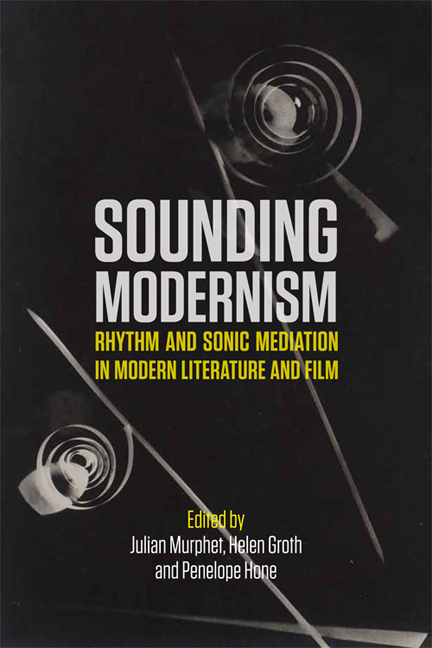Book contents
- Frontmatter
- Contents
- Acknowledgements
- 1 Introduction: Sounding Modernism 1890–1950
- Part One Writing Modern Sound
- Part Two Mediated Voices
- Part Three Difficult Voices
- 9 Harsh Sounds: George Gissing's Penetrating Literary Voice
- 10 Body and Soul: Modernism, Metaphysics, Rhyme
- 11 Listening to the Late Cantos
- Part Four Modern Rhythm: Writing, Sound, Cinema
- Notes on Contributors
- Bibliography
- Index
10 - Body and Soul: Modernism, Metaphysics, Rhyme
from Part Three - Difficult Voices
Published online by Cambridge University Press: 22 December 2017
- Frontmatter
- Contents
- Acknowledgements
- 1 Introduction: Sounding Modernism 1890–1950
- Part One Writing Modern Sound
- Part Two Mediated Voices
- Part Three Difficult Voices
- 9 Harsh Sounds: George Gissing's Penetrating Literary Voice
- 10 Body and Soul: Modernism, Metaphysics, Rhyme
- 11 Listening to the Late Cantos
- Part Four Modern Rhythm: Writing, Sound, Cinema
- Notes on Contributors
- Bibliography
- Index
Summary
By the time Louis Armstrong recorded ‘Body and Soul’ in Los Angeles on 9 October 1930, thereby establishing Johnny Green's sinuous tune as a jazz standard, it was already a hit. But the words for the tune kept changing. ‘My days have grown so lonely, / For I have lost my one and only’, Armstrong pines. ‘My life is sad and lonely; / I wait and sigh for you dear only’, croons Pat O'Malley in the song's first recording, made in London in February with Jack Hylton and his Orchestra. Partly this is because three or four lyricists were involved in composing and recomposing the song over the course of that year, and partly it is because different versions were published in Britain and in America. What's more, in rehearsing amorous banalities the particular words seem not to matter very much. ‘My pride has been humbled’, Armstrong continues, ‘For I'm hers, body and soul’. That final phrase, the song's title, never changed. When Edward Heyman first proposed the title to Robert Sour and Frank Eyton, the three lyricists spent days deciding whether to use ‘body and soul’ at the beginning or the end of a line. The result might have resembled the lyrics Frank Loesser wrote for Hoagy Carmichael's 1938 tune, ‘Heart and Soul’: ‘Heart and soul, I fell in love with you, / Heart and soul, the way a fool would do’. Instead, each refrain of ‘Body and Soul’ returns inexorably to that culminating title phrase: ‘I was a mere sensation; / My house of cards had no foundation; / Although it has tumbled, / I still am hers, body and soul’. Each refrain begins with its own rhyming couplet (‘lonely’-‘only’, ‘sensation’-‘foundation’) and a third rhyme then binds successive refrains (‘humbled’-‘tumbled’). None of these rhymes has the spark of those by a Cole Porter or an Ira Gershwin at his best. The lover's loneliness ironically matches the matchlessness of his one true love; only a common suffix sets the lover's past success against the substance which that success had lacked; and past participles determine both formulations of the lover's fall. But at last, as Green's melody finally resolves on the tonic, nothing rhymes with soul except for soul. No attempt at wit or charm, no sentimental rhetoric or romantic design affects the sense of this word with likeness or contrast.
- Type
- Chapter
- Information
- Sounding ModernismRhythm and Sonic Mediation in Modern Literature and Film, pp. 149 - 163Publisher: Edinburgh University PressPrint publication year: 2017



